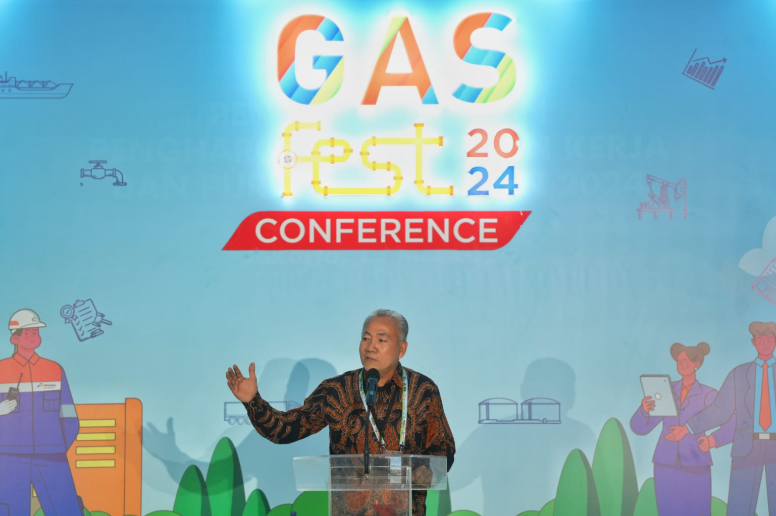Kembali Ke Beranda
26 Mei 2024
Natural Gas Infrastructure and PGN’s Role in Strengthening National Energy Security During the Energy Transition
Jakarta – Energy security has become a top priority for every nation amid the global dynamics influenced by geopolitical upheaval. While ensuring domestic energy security, Indonesia is also undergoing an energy transition, necessitating careful attention to prevent these dynamics from significantly affecting the country’s transition efforts. PGN, as Subholding Gas Pertamina, is committed to playing an optimal role in this transition.
In the Energy & Economic Outlook session at Gasfest 2024, SKK Migas highlighted the need to increase the natural gas market’s development to shield Indonesia from energy volatility and ensure a balance between SKK Migas and K3S’s efforts to maintain investment interest in the upstream oil and gas sector. PGN’s support is crucial to expanding the market and absorbing more natural gas.
“Once the natural gas infrastructure is available, PGN can transport gas from East Java to West Java, which has high demand for gas. PGN’s role is also essential in accelerating the WNTS-Pemping infrastructure to bring gas from Natuna to the domestic market,” said Rayendra Siddik, Head of the Oil and Gas Commercialization Division at SKK Migas.
SKK Migas’ focus on domestic energy needs aligns with Pertamina’s commitment to national energy security and reducing imports. Representing Pertamina, Director of Logistics and Infrastructure Alfian Nasution emphasized that PGN, as Subholding Gas Pertamina, should increase its contribution through the development of household gas networks and cooperation with other subholdings for energy security.
“A key way to reduce LPG imports is by expanding domestic natural gas use, including for households and industries. We hope for government support to build more gas networks,” said PGN’s Commissioner, Amien Sunaryadi.
Natural gas also presents a challenge for Pertamina during the energy transition, while also supporting Pertamina’s low-carbon strategy. Some refineries and upstream plants are expected to use gas, making PGN’s role in gas supply even more crucial.
“Fossil energy will peak by 2030, and renewable energy sources such as solar, wind, and biofuels are predicted to account for 40-45% of total energy demand. However, natural gas demand will continue to rise, making it a significant opportunity for PGN in the energy transition,” stated Alfian.
Support from various stakeholders adds valuable input for PGN, especially in anticipating macroeconomic and global developments related to fossil energy, particularly gas, in this transition phase. “Therefore, we are committed to connecting infrastructure. The eastern regions have no pipelines, so alternative models, such as beyond pipelines, are necessary. PGN will continue to supply gas and ensure reliability,” said PGN’s President Director, Arief Setiawan Handoko.
PGN recognizes that in terms of natural gas infrastructure in Indonesia’s eastern regions, more logistics planning is needed. This includes shipping solutions to support a more sustainable energy transition, particularly considering Indonesia’s archipelagic geography.
PGN aims to capitalize on the opportunity of utilizing natural gas during the transition by integrating existing infrastructure for further development. This integration will help meet the demands of new cities, industrial zones, and transportation via CNG and maritime transport. Additionally, PGN plans to aggregate natural gas demand in power generation, Pertamina’s refineries, and other anchor buyers.
Mangesh Patankar, Vice President of Gas and LNG Consulting at Wood Mackenzie, pointed out that each country has its own scheme for securing energy. Affordability is a critical factor, as it determines how each nation approaches its energy mix while striving to meet Net Zero Emission targets. “In the end, the energy mix must be balanced with energy affordability that is already in place,” said Mangesh.
Kembali Ke Beranda











